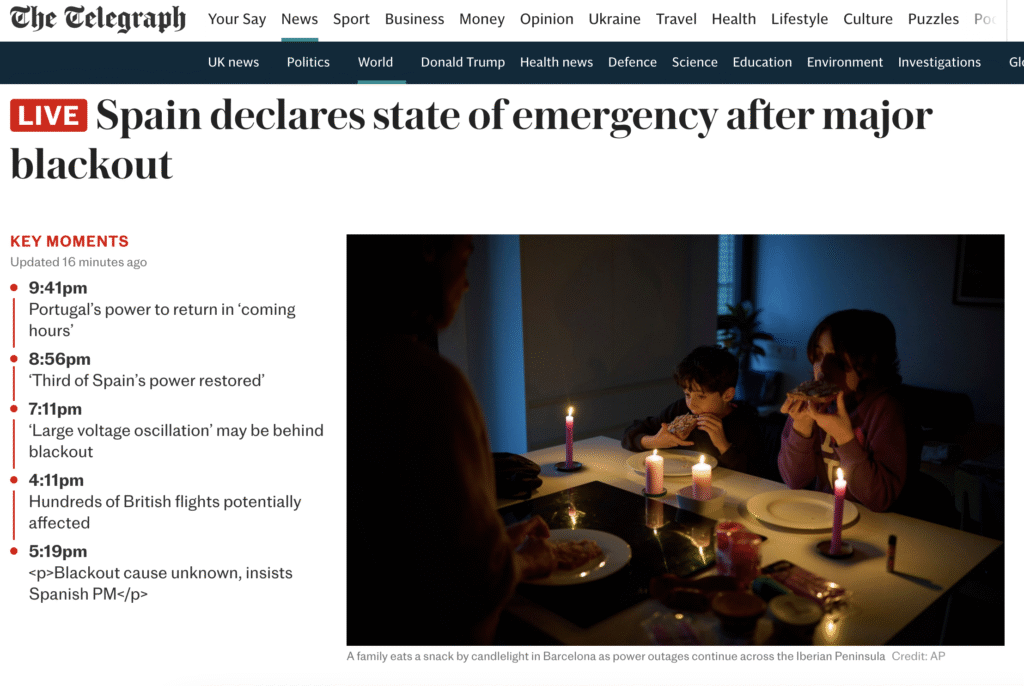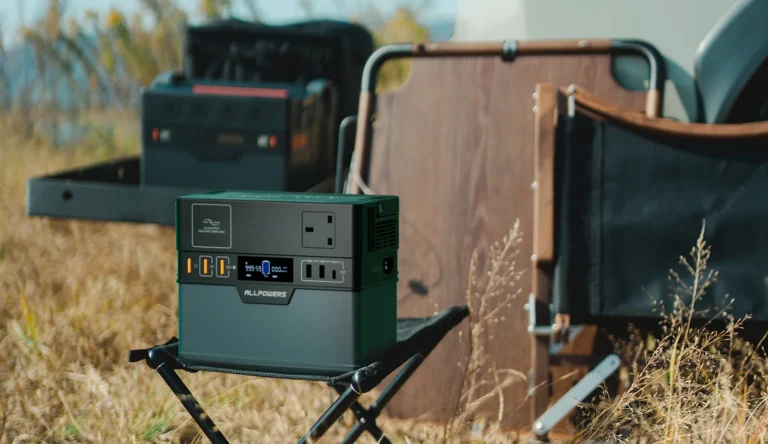What the April 2025 Spain and Portugal Blackout Teaches Us About UK Power Outage Preparedness

On 28th April 2025, a significant power outage swept across Spain and Portugal, stretching into parts of southern France. Millions of people found themselves suddenly without electricity, with transport networks grinding to a halt and shops struggling to operate. In some areas, there were reports of panic buying as residents scrambled for essentials. While investigations into the cause are ongoing, the event serves as a sharp reminder of just how dependent we are on reliable power — and how fragile that dependence can sometimes be. This is a perfect example as to why power outage preparedness in this modern age is so vital.
It’s only natural to wonder whether something similar could happen here in the UK. And while we often like to think of ourselves as better prepared, recent events have shown that our systems are not as robust as we might hope. Just a few weeks ago, Heathrow Airport was plunged into chaos after a fire broke out at the North Hyde substation in Hayes. Over 1,300 flights were cancelled, leaving around 200,000 passengers stranded. Criticism quickly followed as it became clear that Heathrow’s backup systems, the very ones meant to keep the airport ticking over in emergencies, had not been enough to prevent a large-scale disruption.
That incident was sobering on its own, but it also pointed to a broader issue. Our energy infrastructure, while generally reliable, isn’t invulnerable. The National Energy System Operator has already warned that we could face unusually low electricity demand this summer. Paradoxically, that low demand could actually cause grid instability rather than helping matters. Lower demand means more strain on the balancing mechanisms that keep the system stable, especially when combined with the increasing proportion of intermittent renewable energy sources like wind and solar.
Earlier this year, in January, we also came dangerously close to a widespread blackout. Tight margins in the electricity market meant that there was barely enough supply to meet demand on what turned out to be one of the coldest nights of the winter. It wasn’t widely reported at the time — perhaps to avoid causing unnecessary alarm — but industry insiders later admitted it was the closest call we’d had in over a decade.
When you look at these events together, it becomes clear that while blackouts on the scale seen in Spain and Portugal aren’t an everyday risk for the UK, they are far from impossible. And if the worst were to happen, it’s unlikely that the government or local authorities would be able to step in immediately to meet everyone’s needs. Just as we saw during the Heathrow outage, the initial hours — even days — after a major disruption are often marked by confusion, mixed messaging, and stretched resources.
This is where personal preparedness comes into its own. Taking steps now to make sure you can ride out a short to medium-term power cut isn’t about scaremongering; it’s about resilience. It’s about accepting that while we can’t control the grid or prevent accidents from happening, we can control how we respond to them.
One of the most straightforward ways to prepare is by thinking about your own backup power options. Having a way to keep essential devices running — things like your phone, a radio, maybe a small lamp — can make all the difference. Portable power banks, solar panels, or even a small generator can provide a lifeline if the mains go down. It doesn’t need to be complicated or expensive. As I discussed in more detail in my guide to short-term power backup options, even a modest setup can cover the basics. I also cover how I prepare for energy outages here.
Beyond that, it’s wise to make sure you’ve got enough essentials to see you through at least a few days without electricity. This doesn’t mean hoarding mountains of tinned food or building a bunker in the garden. It simply means making sure you’ve got some food that doesn’t need cooking, bottled water, torches that actually have working batteries in them, and perhaps a way to keep warm if the outage happens in winter. During a power cut, even basic tasks like boiling water for tea or charging your phone can become a challenge if you haven’t thought ahead.
Communication is another area where a little foresight can pay off. Power cuts often mean mobile networks become overloaded, and while your phone might still work for a while, coverage can quickly become patchy. Having an agreed-upon plan with family or housemates about where to meet or how to check in can avoid a lot of unnecessary stress.
Staying informed is just as important. When the power goes out, so does much of the information flow we usually rely on. A battery-powered radio can be a real asset, letting you stay connected to news and emergency updates even if the mobile network is down, although a good USB power bank is also useful!
Another practical step, often overlooked, is simply reducing the strain on the grid when you can. While it might seem like a drop in the ocean, small actions like switching off lights you’re not using, running the washing machine at off-peak times, and being generally mindful about energy use all add up. Not only does this help the environment, but it also helps make the grid more resilient at a time when every little bit counts.
The broader lesson from the Heathrow debacle and the blackouts in southern Europe is that we cannot assume the systems we depend on will always work perfectly. They usually do — and that’s a credit to the engineers, planners, and technicians who keep them ticking over day after day. But even the best systems fail sometimes. When they do, having even a modest level of personal preparedness can make the experience far less daunting.
It’s tempting to assume that serious blackouts are only a concern for other countries, places with older infrastructure or different climates. But the reality is that we live in an interconnected world where supply chains, energy grids, and communications networks are often stretched to their limits. The same vulnerabilities that affected millions in Spain and Portugal are present here too, albeit in slightly different forms.
Preparing for power cuts doesn’t have to mean expecting the worst. It’s more about understanding that even short-term disruptions can have a big impact if you’re not ready for them. It’s about taking sensible, proportionate steps to protect yourself and your loved ones. As we’ve seen time and again, those who prepare, even in small ways, are always better off than those who don’t.
The lights going out is unsettling. It reminds us how dependent we are on things we usually take for granted. But with a little forethought, that moment of darkness doesn’t have to be frightening. It can simply be an inconvenience — one you already know how to handle.
Have your own Thoughts? Leave a comment Below 🙂
A little disclosure: there are affiliate links on this website! That just means if you click on a link, find something you like and buy it, this site might receive financial benefit. Don’t worry, you won’t pay any extra – sometimes you might even get a discount. These links help to pay for the upkeep of the site.
Disclaimer: The content of this website is opinion and should never be considered as professional advice. Always consult a professional in the relevant areas.


